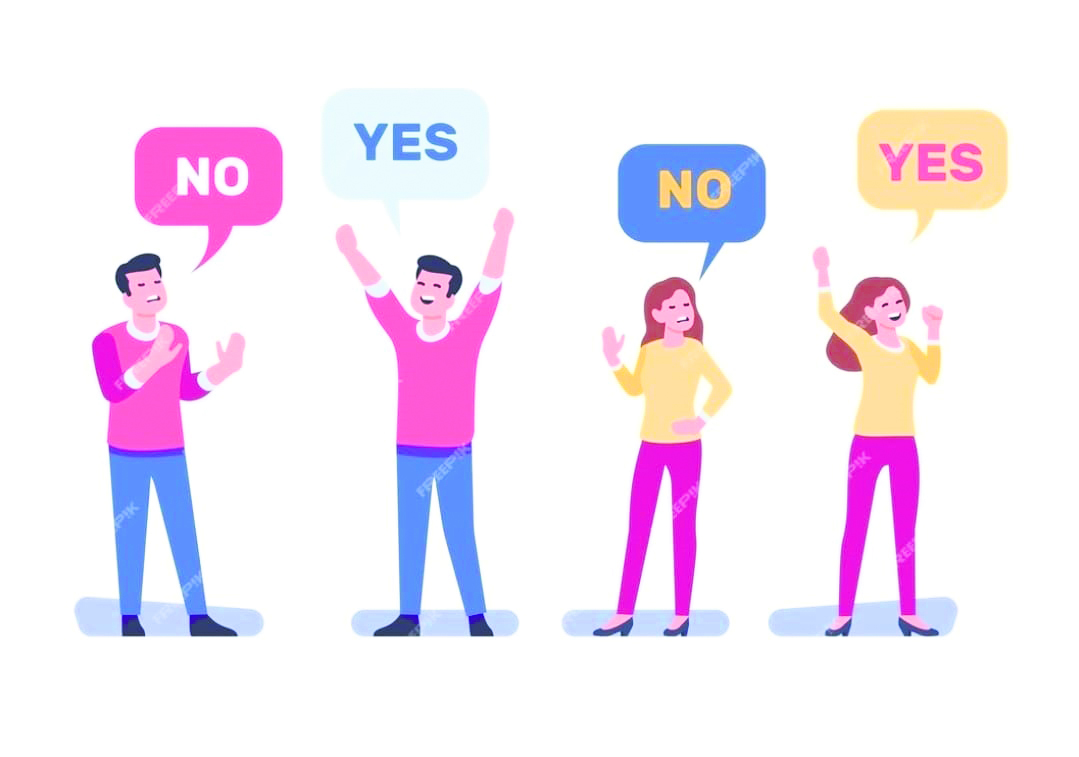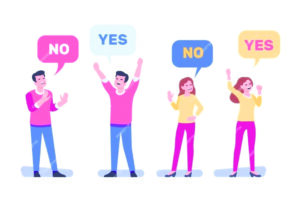We all have struggled with this mind set and wondered what people might think of us? We hope we are not a total disappointment or embarrassment to them? What could we do to make them happy or not upset them? Though we may be in no mood but we can’t say no, they will be hurt, so the best way is to say YES. And just like that most of us become some ‘Yes Man’ so we may not displease people. Have you heard of Gen Z using FOMO (fear of missing out), well it is not entirely to the credits of this generation to have discovered the concept of FOMO, rather the feeling always existed for humans in form of a fear, an insecurity and anxiety of not being included, invited, involved or cared for by the group of people whom we expect to be our friends and family. It was also wrapped around the fear of not being liked, valued, approved and respected by our peers, if we don’t agree with their ways of thinking and living. The natural and an easy option is to say YES.
More than often we think and care about what people perceive of us and we want to make a good impression on others. Sometimes, we might find ourselves going out of our way to make others happy, even at the cost of putting our needs aside. We do have the innate need to take care of people close to us, our friends and family who count on us. But do we have to be that one person taking care of everyone, all the time? When we take the onus of everyone’s happiness on us, we compromise our own will, happiness, and just like that we are not being our own priority anymore and then we are no one’s priority at all. And while doing all this we unconsciously fall into the trap of people-pleasing and It becomes natural for us to want to make people happy but constantly doing this can in fact lead to frustration, especially if you lose touch with what you truly want.
‘Yes Man’ often feels miserable, but why?
The root of being a ‘Yes Man’ often comes from a deep need for acceptance and from a fear of rejection or conflict. The constant urge to meet others’ expectations before your own, can stem from lack of confidence or feeling like they need others’ approval to be happy, to avoid conflict or to feel accepted. It could come from being a perfectionist, where one believes one must do everything right, including ensuring everyone’s happiness around them. This habitual act of saying yes and agreeing with all at all times , could be an unhealthy pattern sprouting from a spiritual wound of believing we are not worthy. People who often sacrifice their own wants or needs in the process of pleasing others, have poor boundaries, struggling to say no, and constantly apologising whenever they fall short of others expectations from them.
The constant efforts to get approval and validations of other people, going out of the way to meet other people’s needs, putting everyone’s needs before our own, leave us vulnerable and though may make us sound agreeable, but not too charming. When we say yes to others all the time, we are choosing to say no to ourselves first. We make ourself wait, compromise, and reducing some of our self-worth on the way to please others. As result in a long way we are bound to feel exhausted, stressful, overwhelmed, anxious, burnout for not prioritising our self-care. When we negate ourselves, always placing our needs, desires, wishes second to those of others, it often lead to people getting habitual of constantly taking from us and us continuously giving to others, out of insecurity or low self-esteem or obligation, or just you being nice.
Human beings are biologically wired for belonging and connection. When we get positive feedback and affirmation, we feel validated, loved and connected. These are healthy emotions and normal human needs. Being a people person might seem like a good thing, but it may have some serious downsides, such as, anger and frustration, burnout weakened relationships due to lack of honesty, stress, anxiety and loss of self-identity.
When you give away a lot to others, you will end up feeling that you have less for yourself.
There is a difference between being amicable and pleasing people. Not all who say yes or avoid confrontations are trying to please, they may just be trying to keep confrontations at an arm’s length, but internally they hold their grounds firm and strong. People who don’t like confrontations, conflicts and are uncomfortable in giving reasons for declining things, the best way for them to escape the situation is to follow people, become the part of the herd, don’t challenge them, accept their word as command. They have misguided beliefs that people like them only because of what they do for them and not because of who they are, and that becomes toxic and they end up compromising their own values and beliefs to please somebody just to get their approval and be in their good books. Eventually they start losing sense of who they are and feel disconnected with their own self, as if nothing remains of who they were. When they find it hard to refuse requests or say no to others, even when it’s something they don’t want to do or don’t have time for, they prioritise being nice to others over their own wellbeing.
Be nice, and learn to say NO.
It’s not at all selfish to prioritise yourself and your mental health. It’s necessary for a healthy, happy life, but people who tend to please feel guilty as though they are disappointing others when they say no and set firm boundaries.
Remember, how the flight attendants often instruct passengers to put their own oxygen mask on first before helping others, this is the first and foremost lesson in self-care. Creating healthy boundaries is like having an oxygen mask on first before rushing and helping others. Without these boundaries, we can easily become drained by others’ expectations and demands, especially when we have gotten in the spiral of consistently prioritising the needs of others over our own. Having boundaries is like setting limits on how much we may give, as and when we choose to give. That doesn’t necessarily mean that we don’t care about others; it just means that we know our own limits and we know how to take care of ourselves fi rst. It helps us in our spiritual well-being and makes us feel worthy of love and respect instead of begrudging them and feeling unworthy.
Setting boundaries is an act of self-love. They define our personal mental, emotional, physical, intellectual and spiritual space where we can nurture meaningful relationships and engage in more purpose driven connections and communications with people who matter to us and to whom we matter. They don’t make us look mean or uncaring. But they do give us strength to make better and wise decisions in saying no and to focus on things which create greater value in our lives. They help us build upon the reservoirs of our inherent potential and bring peace, harmony within our self.
Agree to disagree, learn to respectfully decline and defeat the urge to explain yourself. We need to find a balance between being kind and taking care of our own needs. Others will fail to respect us if we fail to respect our own opinions, feelings and our needs. Our key to a healthy relationship with ourselves lies in the deeper understanding of saying YES to ourselves first, before saying it to anyone else.
‘NO’ is a complete expression, explanation in itself. Learn the skill to say NO, and master the art of how to say NO, so you don’t have to live with the constant need to please people.














